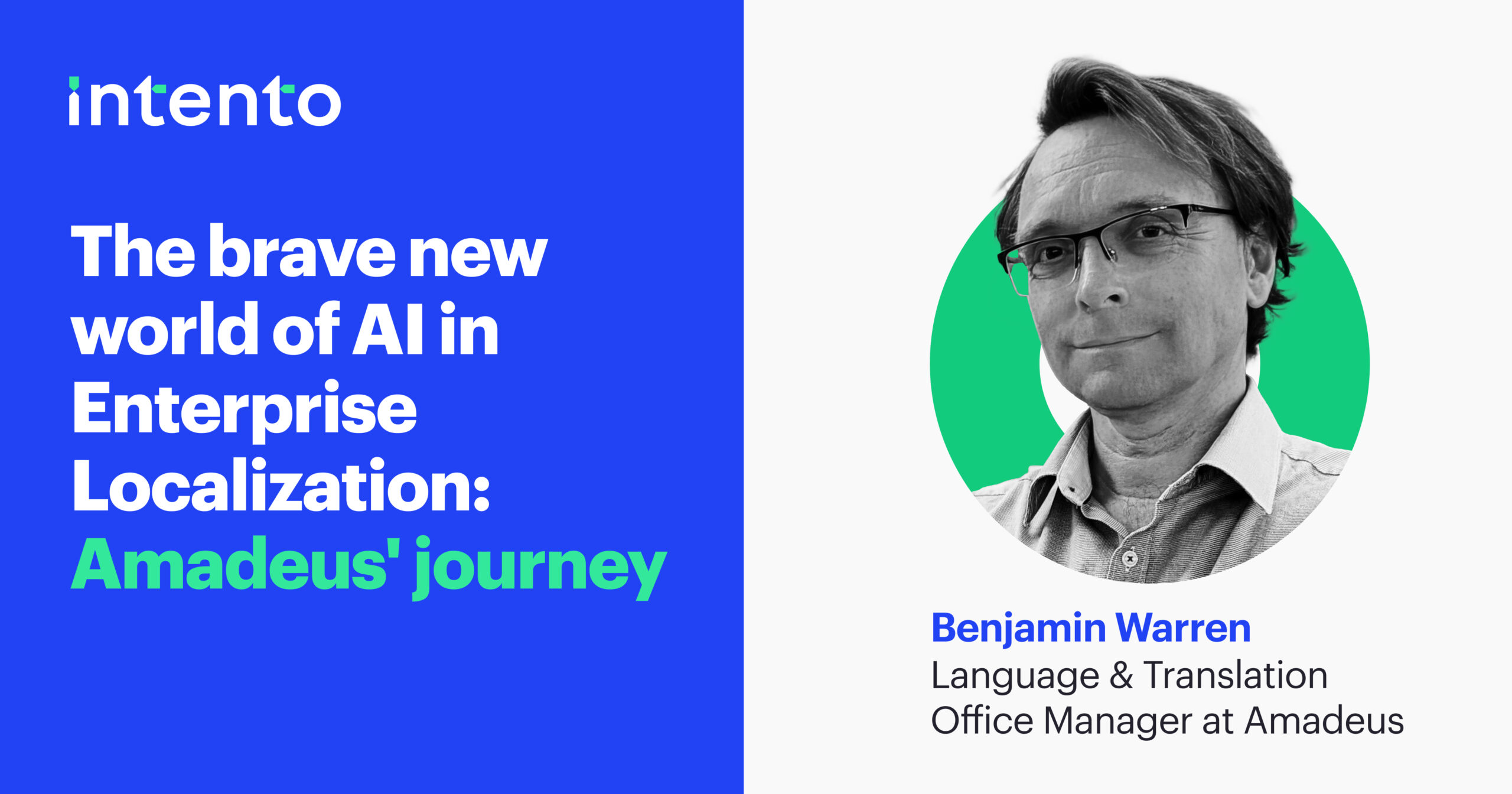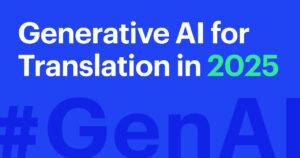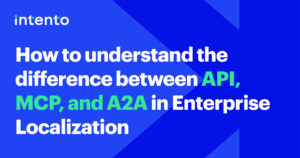How one company’s quest to avoid content bottlenecks led to a transformative approach to language quality
In the fast-evolving landscape of enterprise localization, fear often dominates the conversation. When we talk about AI and large language models (LLMs), many immediately worry about a future where human jobs disappear, replaced by a simple button press. But what if there’s a more nuanced reality? What if AI isn’t coming for jobs but instead transforming them, creating new skilled positions, and enabling humans to focus on higher-value work?
This is the story of Amadeus, one of the world’s largest travel technology companies, and how they reimagined their approach to language and localization. Their journey reveals a powerful truth: the future belongs not to those who resist technological change, but to those brave enough to master it.
Starting with strategy, not technology
Ben Warren, Manager of the Language and Translation Office at Amadeus, didn’t begin with AI. He began with a language strategy.
“It was to know which languages we needed to focus on,” he explains, “because it’s very easy to listen to the languages that make the most noise, but you’re not necessarily getting the same value from those languages.”
This foundational work helped Amadeus understand where to direct resources and how to prioritize efforts. Only after establishing this strategic framework did they turn to examining their concrete pain points and bottlenecks.
A key challenge emerged: as a global company, most of Amadeus’ content comes from non-native English speakers. They had one talented editor who could transform this text into beautiful, rule-conforming English—but therein lay the bottleneck. One editor simply couldn’t scale to handle the company’s growing content needs.
“If I want to scale up all of this information gathering and guarantee quality, I need help,” Ben says. “That’s where LLMs came in for us.”
The myth of the magic tool
Ben is quick to dispel a common misconception about AI: “If you’re just using an LLM because it’s kind of cool and new, or somebody says, ‘Well, it’s 2025, we all use AI now,’ it’s probably not going to work.”
Instead, Amadeus pinpointed exactly what they wanted to achieve. They performed a deep analysis of their content processes, examining past projects to identify recurring patterns. What changes were editors making consistently? What was consuming most of their time?
They categorized these changes: tone of voice issues, basic language problems, grammar, punctuation, house style violations, and Amadeus-specific terminology. This categorization allowed them to focus on changes that would impact the majority of their content—the “magic 70%” that could be fixed automatically.
“For us, our editor in particular, but also our reviewers, shouldn’t be focusing on things that are just recurring issues that we see over and over again,” Ben explains. “If those issues follow a pattern then that is what we felt the LLM is ideally suited to work on.”
Breaking down the language barrier
Traditionally, Amadeus had treated English content and translations as entirely separate domains. Their innovative approach was to recognize that all language is vital and began work to create an unbroken chain from English through to translation.
Working with Intento and MemoQ, they developed two key processes:
- Source Quality Improvement (SQI): Using LLMs to enhance the quality of English source texts
- Automatic Post-Editing (APE): Applying similar technology to improve machine-translated content
The key insight was to treat English like any other language. They moved their editing process into MemoQ, which became their linguistic hub—a central place where all language data could be collected, analyzed, and leveraged.
“We cheat a little bit,” Ben admits with a smile. “We say that we’re moving from British English to American English, even if in reality there is no difference in text.” This clever workaround allowed them to use MemoQ’s translation management capabilities for editing English content, connecting to Intento to launch SQI, and utilizing translation memories from previous edits.
Beyond linguistic perfection
Perhaps most interestingly, Amadeus discovered that perfect linguistic quality isn’t always what matters most to their customers.
“We have to think of feedback in two ways,” Ben explains. “Everyone in this industry wants things to be 100% perfect linguistically because, you know, otherwise, how would we sleep at night? But that’s not necessarily what is always needed.”
Their end customers—travel industry professionals who need to quickly understand Amadeus systems—almost never complain about conjugation or gendered nouns. Their feedback is almost exclusively about terminology: “You used a UI term that is different to the one that we use” or “You’ve used a way of describing a concept that is different to the industry way in my market.”
This realization shifted their perspective. Linguistic perfection matters, but domain-specific terminology and conceptual accuracy matter more. With LLMs handling basic language concerns, human experts could focus on these more valuable areas.
The human element remains essential
Konstantin Savenkov, CEO and co-founder of Intento, emphasizes that this isn’t about replacing humans but amplifying their impact: “To become an expert, you need to spend at least 10,000 hours. When the only leverage you have is a few thousand words you can do in a day… this way, you can leverage your experience to have so much more impact.”
Ben agrees: “This isn’t just a push-button automated process. If you think that way, it will not work. But if you have the right people in the right places with the right skill sets, you can achieve a lot with a very small talented team and really scale up.”
Rather than fearing AI as a job killer, Ben sees it as a job creator. “Instead of having this fear that AI will come for our jobs, we want to say it’s the other way around: because we have these tools that are just tools, we can create new skilled jobs within our company.”
Measuring success beyond metrics
Interestingly, traditional metrics sometimes failed to capture the improvements they were making. When they launched APE in Spanish, the edit distance (a common measure of translation quality) dropped considerably. But when they tried French, the edit distance barely changed.
This initially concerned them until they spoke with their French reviewer, who reported a dramatically different experience: “I made much fewer changes than before. I just changed things slightly differently. And it took me less than half the time.”
Across all languages, review time has been reduced by 60-70%—a remarkable efficiency gain that traditional metrics might have missed.
The partners behind the scenes
Amadeus didn’t achieve this transformation alone. They worked closely with two key partners:
Intento acted as an innovation partner, helping Amadeus identify specific requirements and develop complex, multi-agent workflows tailored to their needs. “We listen very closely to and work very closely with Ben and his Amadeus team to understand what they want to achieve and what are the gaps,” explains Konstantin.
MemoQ provided the infrastructure that made everything work seamlessly. Balazs Kiš, one of MemoQ’s founders, notes: “This was the point—to put the machine and the human together in a way that these connections become really hassle-free.”
The path forward
For Amadeus, these AI-powered workflows are enabling a shift toward more proactive quality improvement. They’re developing a “writing center” concept to help content creators become better writers from the start.
“Instead of just fixing problems afterward,” Ben explains, “if we can spend the time analyzing what those problems were, showing people the difference it makes by fixing them… then it just improves the quality from the starting point even more.”
The future they envision isn’t one where AI replaces humans, but where humans and AI form a powerful partnership, each focusing on what they do best. The LLMs handle the routine linguistic tasks, while humans focus on the specialized domain knowledge, the unique terminology, and the conceptual accuracy that truly matter to end users.
The courage to lead
Konstantin describes Amadeus as “one of the first brave customers” to apply generative AI in this way. When asked about the needed bravery, he offers a telling perspective:
“It’s like kayaking—there’s a rule that even if the river is fast, you need to move faster. You need to control your own destiny.”
In a world where technology is advancing rapidly, standing still isn’t an option. The true leaders aren’t those who resist change but those who embrace it, shape it, and use it to create new possibilities.
“What our job is now might not look the same in five years’ time,” Ben reflects, “but the skills that we’re building and developing now, and the understanding we have now, will be invaluable as this technology progresses, because we can’t ignore it. We just have to master it.”
For anyone concerned about AI’s impact on the future of work, Amadeus offers a powerful counternarrative. The future doesn’t belong to the algorithms. It belongs to the humans brave enough to harness them.



